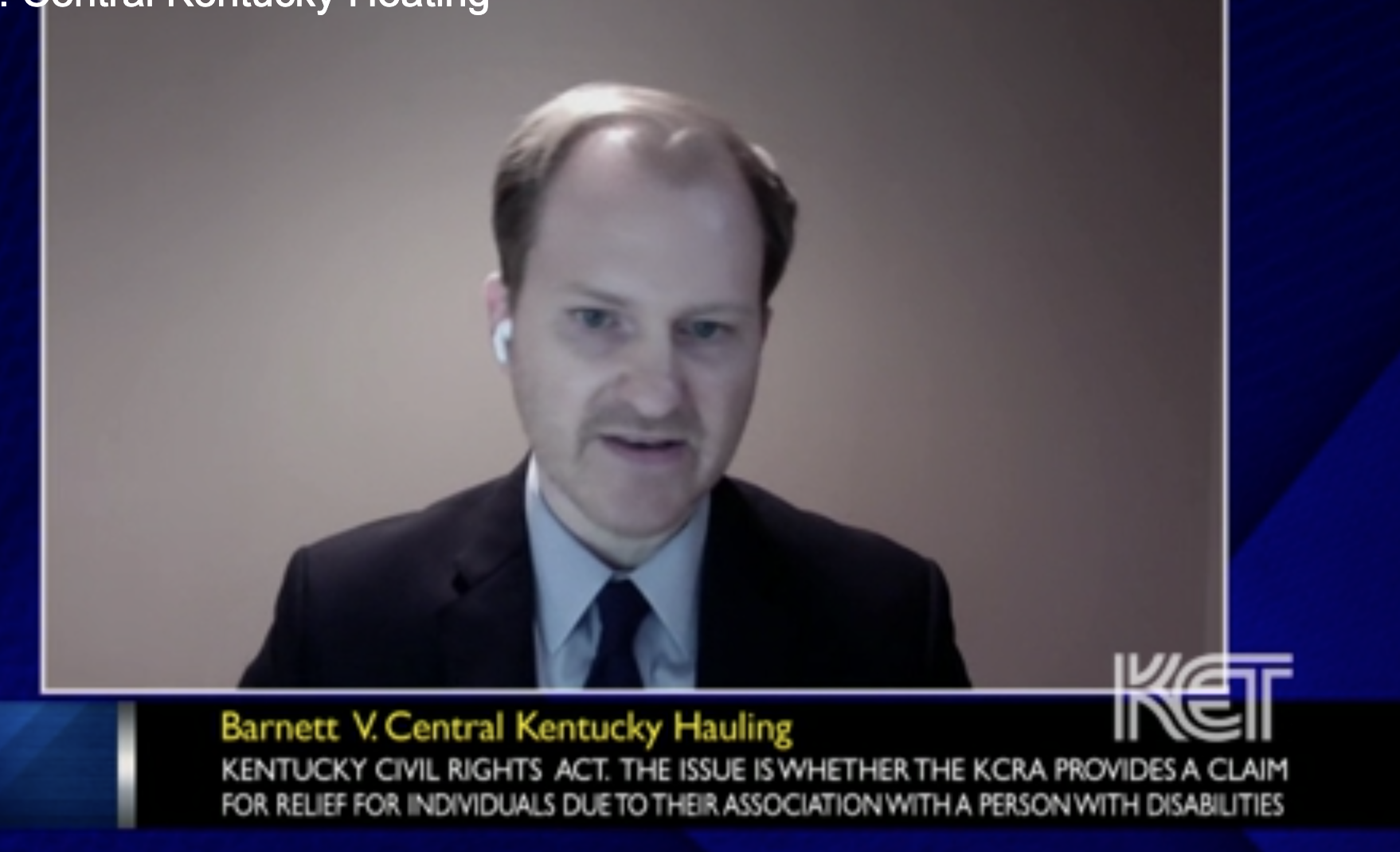The ongoing COVID-19 pandemic has drastically changed the way attorneys across Kentucky and the nation advocate for their clients. Abney Law attorney, P. Stewart Abney, experienced this first hand on May 21, 2020, when he participated in one of the Kentucky Supreme Court’s first virtual Oral Arguments via Zoom. You can watch a replay of the Oral Argument on KET’s website: Barnet v. CKH Oral Argument.

Mr. Abney represents Michael Barnett, the Plaintiff/Appellant in Barnett v. Central Kentucky Hauling, LLC, 2019-SC-000064-DR. In a case of first impression at the Kentucky Supreme Court, Mr. Abney argued that the Kentucky Civil Rights Act prohibits employers from discriminating against employees on the basis of their close association with disabled individuals. In Mr. Barnett’s case, his wife suffered from a debilitating respiratory illness, cystic fibrosis, during the entire time Mr. Barnett was employed at CKH. Mr. Barnett’s employer and supervisors knew of his wife’s illness while he was employed at CKH and, as Mr. Barnett alleged, fired him because of his wife’s disability.
Approximately 29.9% of individuals over the age of 18 in this Commonwealth currently suffer from a disability, a figure that translates to roughly 1.3 million Kentuckians.((DEP’T OF HEALTH AND HUMAN SERVS., CTRS. FOR DISEASE CONTROL AND PREVENTION, DISABILITY & HEALTH U.S. STATE PROFILE DATA FOR KENTUCKY (2018), https://www.cdc.gov/ncbddd/disabilityand health/impacts/kentucky.html.)) Many, if not the vast majority, of these individuals are necessarily dependent upon the care of other persons with whom they share a close familial or personal association—whether a spouse, child, parent, or legal guardian. Although such persons may indeed be subject to the stigma and biases often directed to the disabled individuals with whom they are associated, the decisions by the Fayette Circuit Court and Court of Appeals in this matter would allow employers an unrestricted license to discriminate against these persons on the basis of that association alone.
The purpose of a prohibition on associational discrimination is to prevent employers from taking adverse actions based on unfounded stereotypes and assumptions about individuals who closely associate with people who have disabilities. Unlawful actions such as refusing to hire an individual who has a child or spouse with a disability based on an assumption that the applicant will be away from work excessively or be otherwise unreliable, firing an employee who works with people who are HIV-positive or have AIDS based on the assumption that the employee will contract the disease, or denying an employee health care coverage available to others because of the disability of an employee’s dependent are all acts of associational disability discrimination.
Mr. Abney argued that with the Kentucky Civil Right’s Act’s broad reach, associational disability discrimination is precisely the type of activity the Act is intended to prevent. By prohibiting such discrimination, the KCRA protects employees from adverse actions based on unfounded stereotypes and assumptions about individuals with disabilities with whom such employees are closely associated. Without such protection, employers would be freely able, for example: to deny employment opportunities to an individual with a disabled child or spouse based on the assumption that the applicant will be away from work excessively or be otherwise unreliable; to fire an employee who lives with an HIV-positive person based on the assumption that the employee will contract the disease; or deny an employee health care coverage available to others because of the disability of an employee’s dependent. Such discriminatory actions should find no quarter under the broad scope of protection offered by the Act.
While participating in Oral Argument in from of the State’s highest court via Zoom presented its own challenges, the attorneys at Abney Law are dedicated to doing whatever necessary to deliver justice to our clients and expand the protections available to workers in Kentucky.
We will be sure to update this article when the Kentucky Supreme Court Rules on the case.

